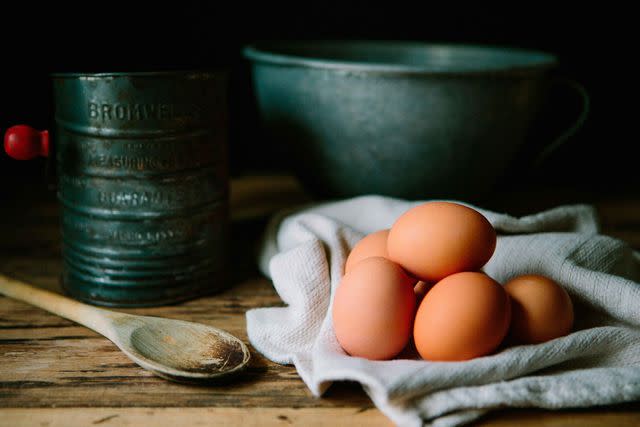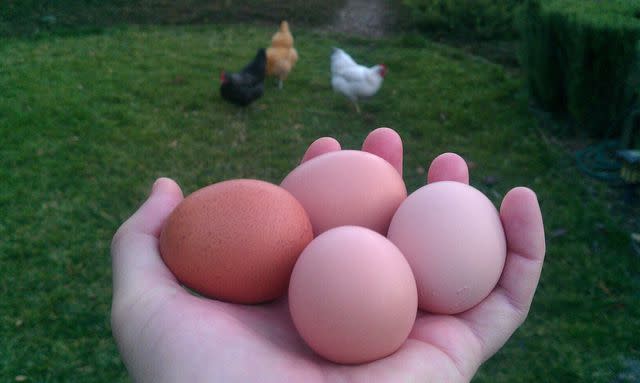How To Make Hard Boiled Eggs Easier To Peel

The secret to perfectly peeled hard-boiled eggs in a jiffy.
Medically reviewed by Jerlyn Jones, MS, MPA, RDN, LD, CLT
We have a love-hate relationship with boiled eggs. They make an appearance in a few of our favorite Southern cuisines, like chicken pot pie, deviled eggs, and potato salad. Of course boiled eggs also serve as a protein-packed salad addition or even just a grab-and-go snack throughout the day.
Cooking eggs is incredibly easy; simply pop them in boiling water and wait. However, the process of peeling hard-boiled eggs isn't nearly as quick and effortless. We often end up burning our hands, getting the shell jammed under fingernails, or even worse, destroying the egg whites. We're here to tell you there is an easier way. Follow these simple tips, and you'll have perfectly peeled hard-boiled eggs in no time.

Use Aged Eggs
As it turns out, older eggs are easier to peel. In a freshly laid egg, the albumen or egg white sticks tightly to the shell. As eggs mature, moisture escapes through the pores in the shell while air passes through the pores. The inside of the egg begins to shrink slightly, while the air pocket in the tip of the egg expands.
This results in the shell loosening from the egg white, making them much easier to peel. So reserve those aged eggs especially for boiling; this will save you time and trouble in the end. Use eggs that have been stored in the fridge for five to 10 days—as long as they're not past the expiration date.
Add Eggs To Boiling Water
Some cooks start by putting the eggs in room-temperature water, setting the pan on the stove, and bringing it to boil. That's a recipe for a shell-sticking disaster. Rather, you want to start your eggs in hot water to make the shell easier to peel. Bring the water to a boil first, then gently lower the eggs into the pan with a slotted spoon or strainer.

Try Steaming The Eggs
While this process is a bit more unconventional, it could be your saving grace. Simply bring your water to a boil, and lower a steamer basket full of eggs into the pot. Let the eggs steam for about 15 minutes before you transfer them to a bowl of ice water. The steaming method tends to loosen the egg membrane, resulting in easier-to-peel eggs to use in your favorite hard-boiled egg recipes. Even better, it's very easy to lower your eggs all at once in a steamer basket, with no potential for splashing yourself with boiling water.
Cool Eggs Quickly In An Ice Bath
Shocking your recently boiled eggs by submerging them into a bowl of ice water is key. The quick cooling of the hard-boiled eggs causes the egg whites to contract, freeing them from the membrane. If you let them cool for about 15 minutes, the peeling is much easier.

Loosen The Shell Before Peeling
Before you begin to dig and pry, give your hard-boiled egg a gentle crack on the counter. Then gently roll it in your hands to loosen the shell. Start peeling at the wide end of the egg, which has an air pocket that is easier to pry open. It may also help to peel your egg under cold running water.
Use A Spoon To Help With Peeling
Here's another time-saving method: Use a small spoon and slip it under the shell at the fat end of the egg, then gently slide it in to separate the shell. You can see how it's done in our article, Why We're Peeling Hard-Boiled Eggs With A Spoon From Now On. This method might take a little practice, but it's a a quick and relatively painless way to peel a hard-boiled egg.
Following these simple tips will save you from unnecessary frustration when boiling hard eggs in the kitchen. Egg-cellent, right?
For more Southern Living news, make sure to sign up for our newsletter!
Read the original article on Southern Living.

